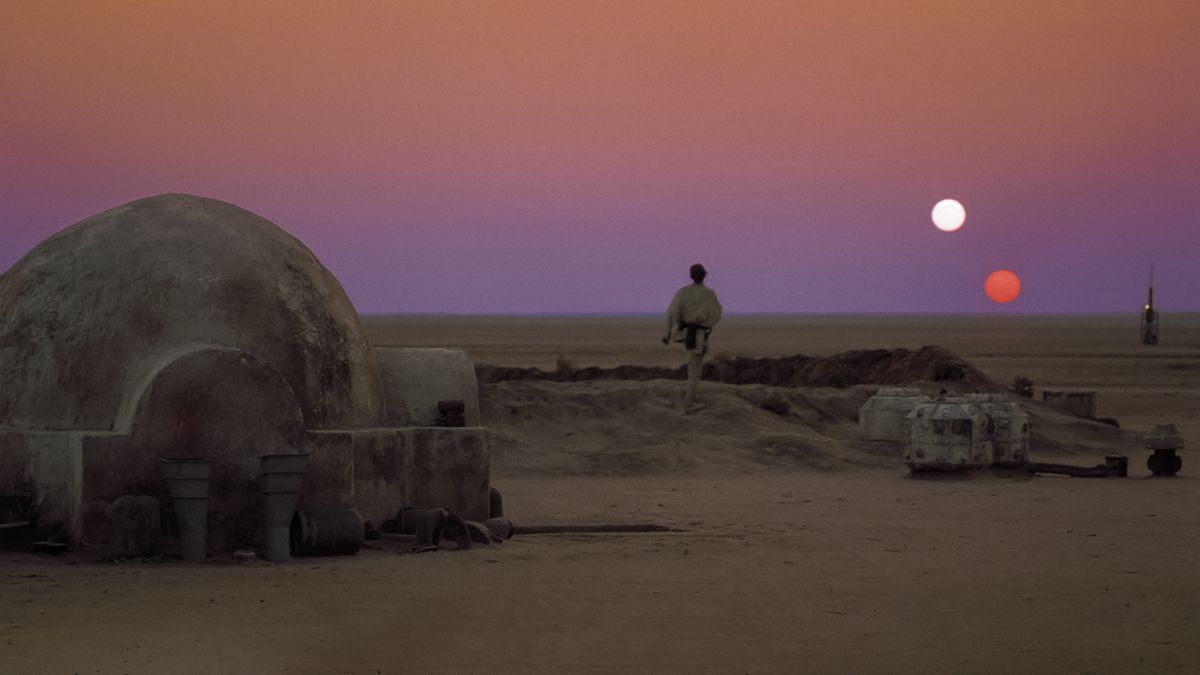Where's the space in space opera?
Most "space opera" is sword & sorcery with a futuristic aesthetic

The last few weeks I watched the original Star Wars trilogy with the family
They're still fun all these years later. Unlike many movies today, you can watch them with your under-12 children and everybody gets something out of it.
Lucas's "special edition" meddling notwithstanding, they stand up to the test of time. I don't even dislike most of the updates, to be honest.
But one detail was on my mind.
This is a story set in a galactic empire with ridiculous technology. They've got hyperdrives that allow spaceships to cross a good chunk of a galaxy in convenient time frames.
That's no small thing.
So why does the setting feel so small?
The Star Wars story could have happened on Earth
The original movie happened in a desert, on a ship, and then in the Bad Guy's high-tech fortress.
Empire Strikes Back happened on an Antarctic expedition and ended with a trip to New York.
Return of the Jedi went back to the desert, then visited a forest before blowing up the Bad Guy's high-tech fortress in a World War 2 naval battle.
This isn't to take away from the beautiful aesthetic of the films.
That dual sunset on Tatooine accompanied by the John Williams score can still hit you right in the gut.
You get a real feeling of being elsewhere.
The original trilogy does this well, despite its portability to more mundane settings.
The Expanded Universe takes this creative bankruptcy to new levels
This is space opera setting that happens in galaxy ruled by a Galactic Empire.
There's so much space you can't even wrap your head around it.
Our own galaxy has in the region of one hundred billion stars as a low-end estimate. The number could edge on up towards the 10-figure count with all the uncertainty involved in counting them all.
The astronomers best estimates suggest that the majority of those stars have planets.
Even if only a fraction of a percent of them are "earth like", that's a whole lot of real estate.
In our real world, you'd best not bet on even the earth-like worlds being habitable for our kind of life.
But the ground rules in Star Wars establish that not only are there lots of life-bearing planets, a good number of them stabilize around parameters that are friendly to earth-like lifeforms.
So why does every story in Star Wars have to come back to the same backwater desert planet?
A whole galaxy and it seems like 9 out of 10 stories (including novels and comics here) can't get away from Tatooine.
You could have told the story even in our own solar system
We forget how much space is in space.
It's not even forgetting. We humans just aren't equipped to conceptualize the vastness of it all.
When we encounter the infinite distances of space and the endless depths of time, we don't think about them at all. We have an intuitive response to it much like when we look at a work of art.
That's all we can do. Thought fails to do justice to the reality. The combination of awe and terror creates an emotional response.
Which is the point of good art.
And that means that you don't even need the exhilarating sprawl of a galactic empire to tell this kind of story.
Mars is your desert planet. Earth is your forest world. You can build habitats in orbit or out of the bigger asteroids for your high-tech forest.
An ecosystem of spacecraft hauls freight around, as needed, ferrying passengers, and maybe even doing some space-fighting stuff in high orbit when needed. (Though this is more likely to happen with armed drones than manned fighters.)
Throw in a dash of psychic wizards, or even super-smart AI if you want to keep it "realistic", and you've got your game board. Go play it.
Is this just nerd whining?
I admit guilt.
Star Wars is a fun and light-hearted adventure story and it should never have fallen into the hands of the cursed worldbuilders.
I don't mean to knock it. I don't even mean to criticize fun space opera that plays loose with "the rules" of today's science.
The stories wouldn't be better, aesthetically or in any other way, if they took place in true-to-life settings. Only obsessive nerds care about that, and it's a bridge too far for myself.
"But why didn't they just set it in a fantasy world?" Because then it wouldn't be Star Wars, genius.
The less of that the better, in my very correct opinion.
But there is a real point to make here. Two points, even.
If you're going to tell a story in space, or anywhere else, the aesthetic feeling is your main concern. Use the setting as a source of characters and story problems. And remember that you're creating an immersive experience for your readers.
The less you tell the reader, the more you only hint and gesture at with light sketches, the more you involve their imaginations.
The other thing is that, if you're telling stories, you can move past the expectations set by the established stories.
I'm not talking about wicked subversion for its own sake. I mean taking established norms of the genre and deliberately playing with them to cook up strange new possibilities out of the familiar.
There are endless possibilities here. If you've got a galaxy to play in, and a hyperdrive to get you around it in a hurry, you can tell a LOT of stories. Ho' lot of stories. More stories than you could imagine.
Why not use the potential, instead of endless retelling and rebooting and prequelizing the same-old territory?
Space is optional in a space opera, but it doesn't have to be
PS – If you enjoy these posts, why not subscribe? That way you can receive them directly in your inbox... and you'll get the members-only posts.
As a bonus perk, members can be a part of the private rogue planet community, where you can discuss this article and hang out with other SFF Heretics. It's not another privacy-thieving jumble of a Facebook group, either.
There's no charge (yet) to subscribe as a free member, so click here and join now.

